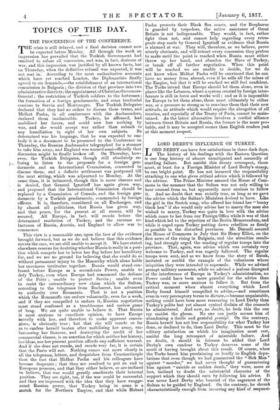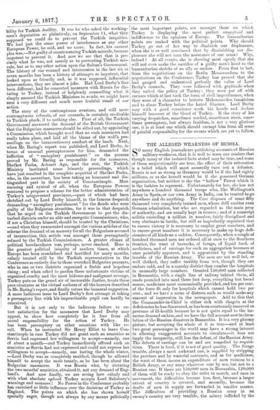LORD DERBY'S INFLUENCE ON TURKEY.
LORD DERBY can have few satisfactions in these dark days; The history of his dealings with the Eastern Question is one long history of almost unmitigated and assuredly of startling failure. But amidst this dreary retrospect, there must, at least for a Foreign Minister of Lord Derby's stamp, be one bright point. He has not incurred the responsibility attaching to one who gives critical advice which is followed by the advisee. The Prime Minister assured the House of Com- mons in the summer that the Sultan was not only willing to hear counsel from us, but apparently most anxious to follow it. And no doubt that was strictly true, as long as we gave the advice which the Sultan's Ministers desired to have. Like the girl in the Scotch song, who offered her friend her "bonny black hen" if she would only advise her to marry the man she wished to marry, Turkey was quite in love with the advice which came to her from our Foreign Office while it was of that kind which led to the rejection of the Berlin Memorandum, and while it urged upon Turkey putting down rebellion as firmly as possible in the disturbed provinces. Mr. Disraeli assured the House of Commons in July that Sir Henry Elliot, on the first news of the rising in Bulgaria, and the atrocities result- ing, had strongly urged the sending of regular troops into the province. That, again, was advice which was certainly very welcome to Turkey, and was eagerly followed. The regular troops were sent, and as we know from the story of Batak, imitated or outdid the example of the volunteers whose iniquities they were intended to supersede. While we advised prompt military measures, while we advised a jealous disregard of the interference of Europe in Turkey's administration, no Power could have been more grateful for the advice than Turkey was, or more anxious to follow it. But from the critical moment when almost everything which Lord Derby found himself compelled to advise,—and sometimes even in very peremptory terms to dictate,—became unpalatable, nothing could have been more reassuring to Lord Derby than Turkey's polite but yet almost cynical disdain of the counsels he administered. And now, no doubt, he feels this the one ray amidst the gloom. No one can justly accuse him of abandoning a docile and grateful prote'ge. On the contrary, Russia herself has not less responsibility for what Turkey has done, or declined to do, than Lord Derby. This must be the solitary satisfaction on which his imagination must rest, amidst the long retrospect of miserable failure. And no doubt, it should in fairness be added that Lord Derby's own candour to Turkey deserves some of the merit of having brought about this result. Of course, when the Turks heard him proclaiming so loudly to English depu- tations that even though we had guaranteed the "Sick Man" against "murder," we had never thought of guaranteeing him against "suicide or sudden death," they were, more or less, inclined to doubt the substantial character of the support which they should earn by following his advice. It was never Lord Derby who boasted of the eagerness of the Sultan to be guided by England. On the contrary, he shrank characteristically enough from incurring any kind of responsi-
bility for Turkish docility. It was he who asked the working- men's deputation so plaintively, on September 11, what they supposed we could do to prevent the Turkish iniquities. We had just the same power of interference as any other European Power, he said, and no more. In fact, his earnest plea was,—Not guilty of countenancing Turkish misrule, because impotent to prevent it. And now we see that that is pre- cisely what he was, not merely as to preventing TurlFish mis- rule, but as to any other action upon the Sultan's Government. The history of our counsel and intercession in the last six or seven months has been a history of attempts so impotent, that looked upon as friendly and, as it was supposed, influential interventions, they are almost a joke. Had Lord Derby's line been different, had he concerted measures with Russia for dic- tating to Turkey, instead of helplessly counselling what it simply amused the Turkish Ministers to evade, we might have seen a very different and much more fruitful result of our action.
The story of the contemptuous evasions, and still more contemptuous refusals, of our counsels, is certainly creditable to Turkish pluck, if to nothing else. First of all, the Turkish Government answered the demand of the British Government that the Bulgarian massacres should be sifted out, by appointing a Commission, which brought word that no such massacres had really taken place, and laid all the blame of the wolf's pro- ceedings on the insurrectionary conduct of the lamb. Next, when Mr. Baring's report was published, and Lord Derby, in terms of unusual peremptoriness for him, demanded the infliction of "exemplary punishment" on the persons proved by Mr. Baring as responsible for the massacres, Shefket Pasha, Achmet Aga, and the rest, the Turkish Ministry instituted some leisurely proceedings, which have just resulted in the complete acquittal of Shefket Pasha, who, in the meantime, has been taking an honoured and dis- tinguished part in the society of Constantinople. Most amusing and cynical of all, when the European Powers ventured to propose a scheme for the better administration of Turkey's misgoverned provinces,—part of which had been sketched out by Lord Derby himself, in the famous despatch demanding "exemplary punishment" for the fiends who were guilty of the Bulgarian atrocities, for it was in that despatch that he urged on the Turkish Government to put the dis- turbed districts under an able and energetic Commissioner, who, if not a Christian himself, should be trusted by the Christians, —and when they enumerated amongst the various articles of the scheme the demand of an amnesty for all the Bulgarians accused of insurrection, this article was amongst those peremptorily refused by the Turkish Commissioners. A greater climax of political barefacedness was, perhaps, never reached. Here is the greatest political iniquity of modern times, at which Europe has been scandalised and horrified for many months, calmly treated still by the Turkish representatives in the Conference as entirely due to those wretched Bulgarian peasants, who in one or two districts organised a feeble and hopeless rising ; and when asked to pardon these unfortunate victims of organised cruelty and the most hideous and malignant revenge, Turkey puts on the grand air of inexorable Justice, treats these poor creatures as the virtual authors of all the horrors described in Mr. Baring's report, and finally vetoes the immoral suggestion. A more ludicrous issue to Lord Derby's first attempt at taking a peremptory line with his impracticable pupil can hardly be conceived.
But it is not only to the ludicrous failure to ex- tort satisfaction for the massacres that Lord Derby may appeal, to show how completely he is free from all moral responsibility for the action of Turkey. He has been peremptory on other occasions with like re- sult. When he instructed Sir Henry Elliot to leave Con- stantinople in case Turkey did not grant such an armistice as gervia had expressed her willingness to accept—namely, one of about a month—and Turkey immediately offered such an armistice as Servia had not expressed and could not express her willingness to accept—namely, one lasting the whole winter, —Lord Derby was as completely snubbed, though he allowed himself to accept the snub tamely, as he has been about the Bulgarian massacres. It was Russia who, by dictating the two months' armistice, obtained it, not any demand of Eng- land's. And now finally, we are seeing how calmly and with what absolute aplomb Turkey accepts Lord Salisbury's warnings and menaces I No Power in the Conference probably has exercised so little influence over the decisions of Turkey as England. The points on which she has shown herself specially eager, though not always by any means politically
the most important points, are amongst those on which Turkey is displaying the most perfect sang-froid and indifference to the opinions of Europe. The humanitarian points are ranked with the political points. Why should Turkey go out of her way to diminish our displeasure, when she is so well convinced that by diminishing our dis- pleasure she will not earn the assistance of our arms? Why, indeed ? At all events, she is showing most openly that she will not even make the sacrifice of a guilty man's head to the humanitarian shrieks of an ally so useless. From first to last, from the negotiations on the Berlin Memorandum to the negotiations on the Conference, Turkey has proved that she had gauged and understood perfectly the value of Lord Derby's counsels. They were followed with gratitude when they suited the policy of Turkey ; they were put off with excuses which at last took the form of civil impertinence, when they were of a character to irritate Mahommedan fanaticism and to abase Turkey before the hated Giaours. Lord Derby may with a good conscience wash his hands and declare himself innocent of the blood of Turkey. If the story of his varying despatches, sometimes cordial, sometimes stern some- times peremptory, but always fruitless, is not a very glorious one, it is at least one which should exempt him from all sense of painful responsibility for the events which are yet to follow.










































 Previous page
Previous page